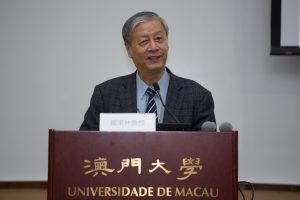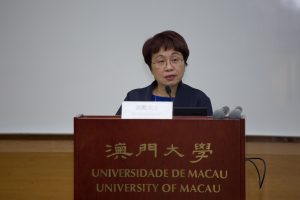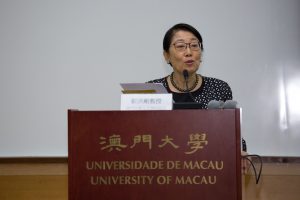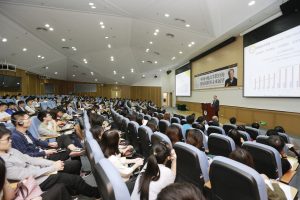The University of Macau (UM) today (10 November) held a Doctor honoris causa Lecture titled ‘Higher Education in the Chinese Mainland: the Present and the Future’. Binglin Zhong, recipient of an honorary doctorate from UM, president of the Chinese Society of Education, and former president of Beijing Normal University, was the keynote speaker. During the talk, he discussed the current and future development of higher education in mainland China from different perspectives. The talk attracted many UM faculty members and students, secondary school teachers and students, experts and scholars from the education industry, as well as prominent members of the community. Zhong thinks the current educational philosophy and model need to keep pace with the new trends, and he praises UM’s ‘4-in-1’ model of education.
In her speech, Leong Lai, director of the Education and Youth Affairs Bureau, said that Zhong has been dedicated to education for a long time, adding that he spearheaded a raft of significant education programmes in mainland China and made significant contributions to the promotion of higher education policies and scientific research. She added that Zhong worked hard to foster inter-regional educational collaboration and exchange. During his presidency at Beijing Normal University, the university was commissioned to run the first training course for Chinese teachers from primary and secondary schools in Macao.
In her speech, Hong Gang Jin, dean of the Faculty of Arts and Humanities, said that all parents hope their children can receive quality higher education that increases their international competitiveness and prepares them for a better future. Higher education in the 21st century is faced with numerous challenges, such as knowledge explosion, the rapid development of big data technology, and the increasing trend towards globalisation. She believes that Prof Zhong’s insightful views on higher education development in mainland China will stimulate meaningful discussion on this topic.
During the talk, Zhong discussed the current development of higher education in mainland China, including its achievements, major conflicts, and development trends. He pointed out that in order to solve the major conflicts, three issues need to be addressed. The first is how to constantly increase resources for quality education and improve the quality of education. The second is how to allocate the limited educational resources to promote educational equity. The third is how to gradually raise China’s international status in education and promote the internationalisation of education. Zhong also shared his outlook for China’s higher education development from four perspectives, including educational philosophies and the university admission test. He believes that educational philosophies and models need to be constantly revised and that educators need to review traditional ways of teaching and make adjustments according to modern needs. Only by doing so will Chinese universities be able to offer education that caters to the different needs of different students and that brings out the best in the students. He praised UM’s unique ‘4-in-1’ model of education, saying that it has already created a significant impact in mainland China. During the question and answer session, Zhong had an in-depth discussion with the audience on challenges facing higher education in mainland China.
Zhong is a renowned educationaist. He currently serves as the president of the Chinese Society of Education and the honorary vice president of Cardiff University. He has taught at Beijing Normal University and has been appointed director-general of the Department of Higher Education at the Ministry of Education. During his term as the director-general, he initiated higher education reforms in governance and curriculum, as well as instituted quality assurance of bachelor’s degrees. He has published more than 100 papers in such key academic journals as Educational Research, Journal of Higher Education, and China Higher Education.




